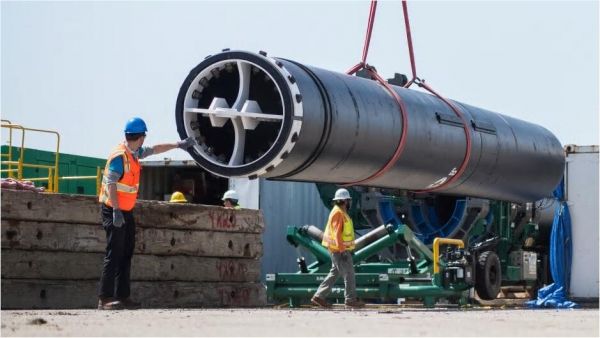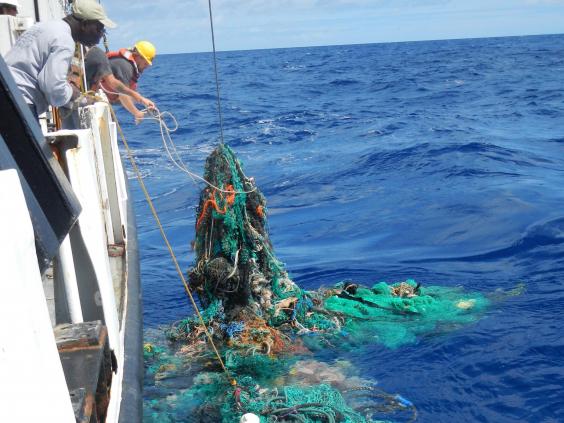世界首台海洋塑料清理机将启用 尝试处理太平洋垃圾带碎片 World's first ocean plastic-cleaning machine set to tackle Great Pacific Garbage Patch
中国日报网 2018-04-25 13:18

联合国去年底发布警告称,每年有数百万吨塑料垃圾进入海洋,并正造成“不可挽回的损失”,海洋生物正面临着巨大威胁,而这些塑料碎片很可能因为食用鱼类出现在我们体内。荷兰一家名为“海洋清理”的非营利性技术公司将启用世界首台海洋塑料清理机,收集处理“大太平洋垃圾带”碎片。
 |
| 这些焊接在一起的巨大管子将构成海洋塑料清理机的主体(荷兰“海洋清理”公司网站) |
Scientists are preparing to launch the world's first machine to clean up the planet's largest mass of ocean plastic.
科学家们正准备率先使用机器清理地球上最大海洋塑料垃圾堆。
The system, originally dreamed up by a teenager, will be shipped out this summer to the Great Pacific Garbage Patch, between Hawaii and California, and which contains an estimated 1.8 trillion pieces of plastic.
该清理系统源自一名青少年的构想,将在今年夏天被运往“大太平洋垃圾带”。大太平洋垃圾带位于美国夏威夷和加利福尼亚之间,总共有大约1.8万亿片塑料。
It will be the first ever attempt to tackle the patch since it was discovered in 1997.
这将是自1997年发现该垃圾带以来首次尝试对它进行处理。
The experts believe the machine should be able to collect half of the detritus in the patch – about 40,000 metric tons – within five years.
专家们认为,这种机器应该能在5年内收集垃圾带中一半的碎片,总重量约4万吨。
In the past few weeks they have been busy welding together giant tubes that will sit on the surface of the sea and form the skeleton of the machine, creating the largest floating barrier ever made.
在过去几周里,他们一直在忙着将巨大的管子焊接在一起。这些管子将被放置在海面上,构成机器的主体,也成为有史以来人类制造的最大的漂浮屏障。
The Great Pacific Garbage Patch (GPGP) spans 617,763 sq miles - more than twice the size of France, and contains at least 79,000 tons of plastic, research found last month.
上月的一项调查发现,大太平洋垃圾带的面积达到61万7763平方英里(约合160万平方公里),是法国面积的两倍多,其中含有至少7.9万吨塑料。
Most of it is made up of “ghost gear” – parts of abandoned and lost fishing gear, such as nets and ropes – often from illegal fishing vessels.
塑料主要由“幽灵渔具”构成,包括废弃或丢失的渔网、绳索等渔具的组件,而这些渔具大都来自非法捕鱼船只。
 |
| Nearly half the debris collected from the Great Pacific garbage patch consisted of discarded fishing nets (The Ocean Cleanup Foundation) |
Ghost gear kills more than 100,000 whales, dolphins and seals each year, according to scientific surveys. Seabirds and other marine life are increasingly being found dead with stomachs full of small pieces of plastic.
科学调查显示,幽灵渔具每年导致超过10万头鲸、海豚和海豹死亡。越来越多的海鸟和其他海洋生物被发现死亡时胃里装满了小块塑料。
More than 8 million tons of plastic is dumped into our oceans every year, according to the US-based Plastic Oceans Foundation.
总部位于美国的塑料海洋基金会表示,每年有超过800万吨塑料被倾倒入海洋。
Up to 90 percent of the world’s plastic items are never recycled, and scientists believe nearly every piece ever created is still in existence somewhere, in some form, with most going into landfill or the environment. Single-use plastic, such as water bottles and nappies, take 450 years to break down.
世界上有多达90%的塑料制品从来没有被回收利用,而科学家认为几乎每一片制造出来的塑料都以某种形式存在于某个地方,其中大部分进入到垃圾填埋场或环境中。水瓶和尿片等一次性塑料制品需要450年才能够降解。
The system to tackle the largest swirling mass of rubbish in the Pacific has been designed by a non-profit technology firm called The Ocean Cleanup, set up by Dutch inventor Boyan Slat when he was an 18-year-old aerospace engineering student.
用于处理太平洋上最大垃圾带的系统是由一家名为“海洋清理”的非营利性技术公司设计的,该公司由荷兰发明家博扬•斯莱特创建,当时他还是一名18岁的航空航天工程系学生。
“What I really hope is that the ocean clean-up in this century can be a symbol for us using technology to make things better.”
斯莱特说:“我真正希望的是,本世纪的海洋清理能够成为我们利用技术使世界变得更加美好的标志。”
The clean-up contraption consists of 40ft pipes – ironically made of plastic – that will be fitted together to form a long, snaking tube.
这套清理装置由40英尺(约合12米)长的管子组成——具有讽刺意味的是这些管子也是塑料的,它们将被连在一起,形成一个蛇形的长管。
Filled with air, they will float on the ocean's surface in an arc, and have nylon screens hanging down below forming a giant floating dustpan to catch the plastic rubbish that gathers together when moved by the currents. The screens, however, will be unable to trap microplastics – tiny fragments.
充满空气的管子将呈弧形漂浮在海面上,下面悬挂的尼龙筛网将形成一个巨大的漂浮簸箕,捕获随着水流移动而聚集在一起的塑料垃圾。不过,这些筛网无法捕获塑料微粒——极其微小的碎片。
Fish will be able to escape the screens by swimming underneath them.
鱼能够从筛网下面游过,不会被它们捕获。
The Ocean Cleanup team aim to launch the beginnings of the system from the shores of San Francisco Bay within weeks, start it working by July and then keep extending it.
“海洋清理”公司团队计划在几周之内从旧金山湾区的海岸开始投放这种系统,在7月底之间开始启用,然后不断扩大作业面积。
They plan to have 60 giant floating scoops, each stretching a mile from end to end. Boats will go out to collect debris every six to eight weeks.
他们计划放置60个巨大的漂浮簸箕,每一个簸箕的跨度为1英里(约合1.6公里),然后每隔6到8周会派出船只去收集捕获的塑料碎片。
Mr Slat was 16 and still at school when he was diving in Greece and first saw for himself the amount of plastic polluting the sea.
16岁的斯莱特还在上学时曾经去希腊潜水,第一次亲眼看到了污染大海的塑料垃圾的数量。
“There were more bags than fish down there,” he recalls. Two years later he came up with a solution, quit university after six months and set up The Ocean Cleanup as a company.
他回忆道:“那里的塑料袋比下面的鱼还要多。”两年后,他想出了一个解决方案,并在上大学6个月后退学,创建了“海洋清理”公司。
Following a crowdfunding campaign that raised £1.57m and later investment bringing the total to £28.56m, the company now has 65 paid staff, including researchers and engineers.
该公司经过众筹活动筹集到157万英镑(约合1383万元人民币),后来得到的投资使得筹资总额达到2856万英镑(约合2.5亿元人民币),现在公司拥有65名员工,其中包括研究人员和工程师。
Mr Slat, 23, says the first plastic to arrive on shore will be a major milestone.
现年23岁的斯莱特说,第一块被送到岸上的塑料将成为一个重要的里程碑。
“We as a humanity created this problem, so I think it's our responsibility also to help solve it,” he said.
他说:“作为人类,我们制造了这个问题,所以我认为我们也有责任帮助解决这个问题。”
He told US business website Fast Company: “Most of the plastic is still large, which means that in the next few decades if we don’t get it out, the amount of microplastics can be tenfold or 100-fold.”
斯莱特对美国快公司商业网站说:“大多数塑料垃圾仍然很大,这意味着如果我们在未来几十年里不把它们清理出来,塑料微粒的数量就可能达到现在的10倍到100倍。”
来源:独立报、参考消息网
翻译&编辑:yaning

















 英语点津微信
英语点津微信 双语小程序
双语小程序